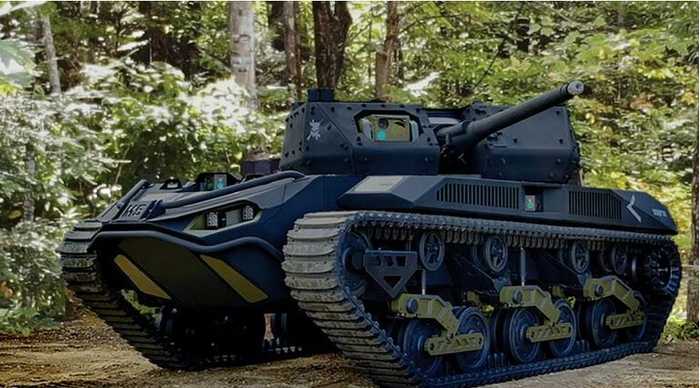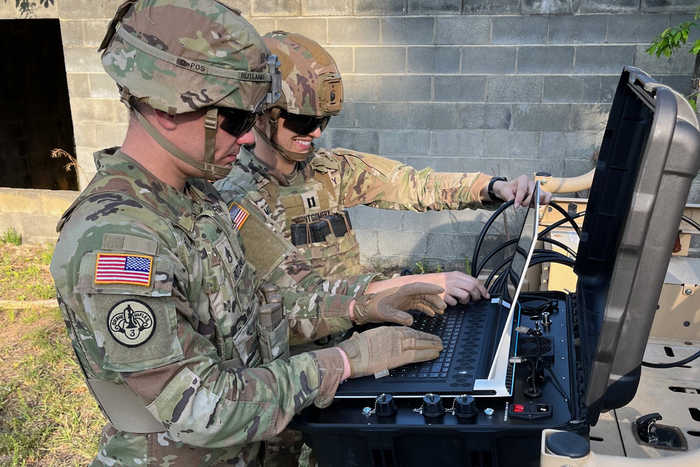Published 19:44 IST, June 13th 2024
U.S. Army to Test Robotic Combat Vehicles in Opposing Force Training Rotations
The U.S. Army's Robotic Combat Vehicles (RCVs) are set for a significant test as they will face off against opposing forces in upcoming training rotations.
- Defence
- 4 min read
California: The U.S. Army's Robotic Combat Vehicles (RCVs) will face off against an opposing force in an upcoming training rotation, marking a significant step in evaluating their combat effectiveness. Maj. Gen. Geoff Norman, head of the Army's combat vehicle modernization efforts, announced this development, highlighting the Army's focus on integrating advanced robotics into future battle strategies. While the Army has conducted extensive experimentation with RCV surrogates and prototypes, this will be one of the first opportunities to assess how these vehicles perform against an enemy with similar capabilities.
Norman revealed in an interview with Defense News that two National Training Center rotations are scheduled for this summer. A unit from Fort Stewart in Georgia will engage with an RCV platoon, while a subsequent unit from Fort Riley in Kansas will incorporate the same RCV platoon into the blue force. “That’s going to be exciting to do another round of learning and experimentation at the premier training event for those units,” Norman said, underscoring the significance of these exercises for the Army's future operational tactics.
Additionally, the Army will receive prototypes from four competing teams this summer as part of the Robotic Combat Vehicle program-of-record platform. This competition aims to select the most effective design for future deployment. The prototypes will undergo rigorous automotive testing at Aberdeen Proving Ground, Maryland, and Yuma Proving Ground, Arizona, starting in August. The government will then decide which prototypes will advance to the next phase of the program in the spring of the following year.
Prototype Testing and Selection Process Underway
The Army has selected McQ, Textron Systems, General Dynamics Land Systems, and Oshkosh Defense to build light RCV prototypes. The selection process is critical as the Army plans to field the first RCV unit by fiscal year 2028, following a production decision slated for FY27. In addition to this, the Army aims to equip an Army Forces Command unit with an RCV platoon for further experimentation, though resourcing this effort is still in progress. "We’re hopeful that materializes but that’s an open issue that we’re working through," Norman noted.

Norman's team is collaborating closely with the armour commandant's office and the Maneuver Capability Development and Integration Directorate at Fort Moore, Georgia. This partnership aims to refine the organizational designs for RCV platoons and determine the necessary supporting equipment. “They’ve taken the RCV playbook that we’ve developed at a couple of different experiments and they’re now taking that to work on some initial doctrine or probably standing operating procedure, to standardize some of the tactics, techniques and procedures that robotic autonomous systems operators need,” Norman explained.
The Army is also working on developing control vehicles for the RCVs, using platforms like the Armored Multipurpose Vehicle (AMPV) and the Bradley Infantry Fighting Vehicle. A Stryker control vehicle prototype has already been developed, and the Joint Light Tactical Vehicle will also be configured as a control vehicle. This prototyping will follow the work on the AMPV and Bradley. "Key to that will be soldier touch points to get their feedback because that’s been essential to get it right up to this point,” Norman emphasized.
Future of Robotic Combat Vehicles in the U.S. Army
As the U.S. Army continues to innovate and adapt to modern warfare's evolving demands, the integration of Robotic Combat Vehicles represents a significant leap forward. These upcoming training rotations and prototype evaluations will provide valuable insights into how RCVs can be effectively utilized in combat scenarios. The Army's efforts to standardize operational procedures and refine organizational structures for RCV units are crucial steps in ensuring these advanced systems enhance the Army's combat capabilities.

The development and deployment of Robotic Combat Vehicles are poised to transform battlefield dynamics, offering new tactical advantages and operational efficiencies. With continued experimentation and feedback from soldiers, the Army aims to perfect the use of these robotic systems, making them an integral part of future military operations.
Updated 19:44 IST, June 13th 2024